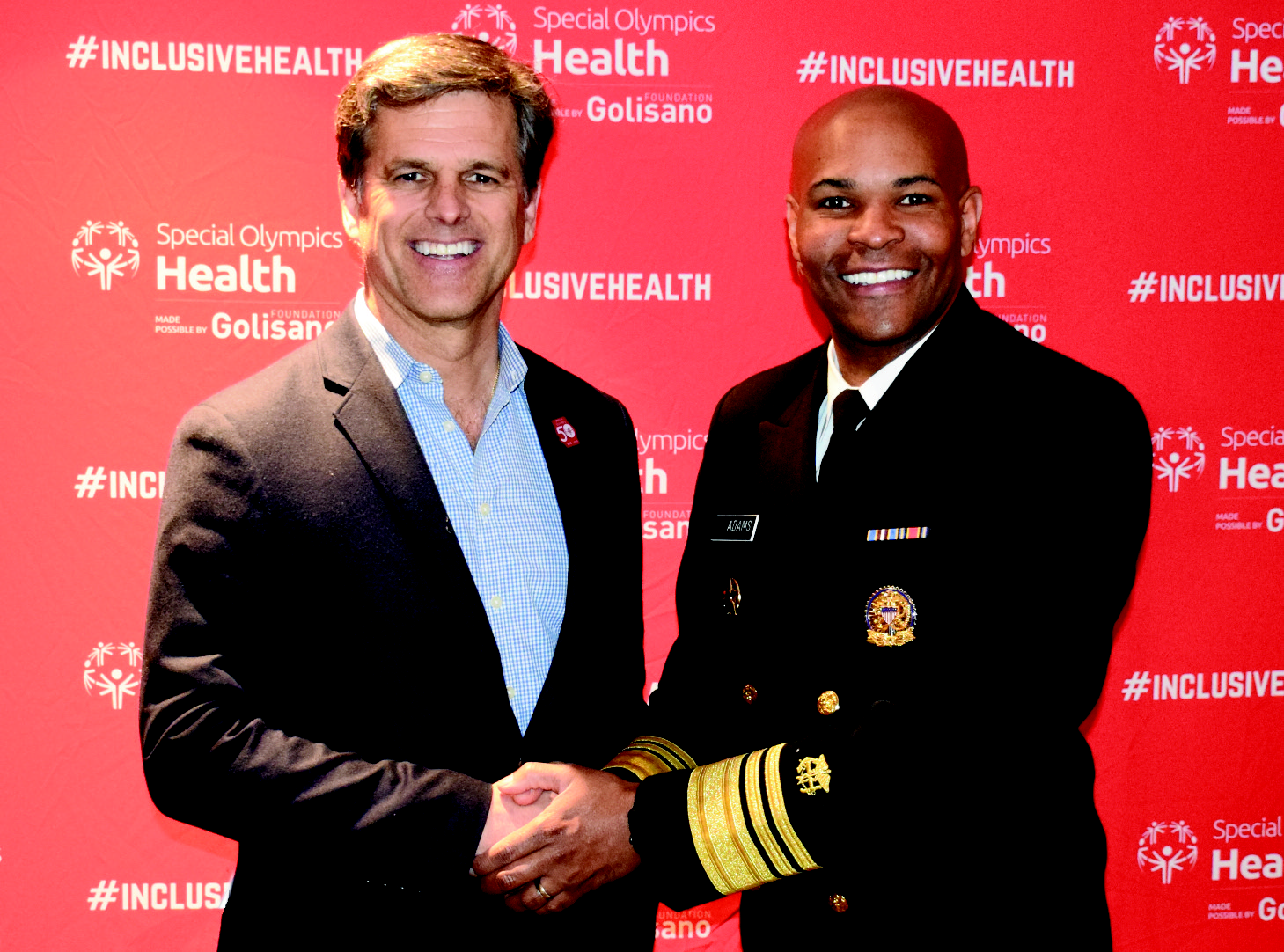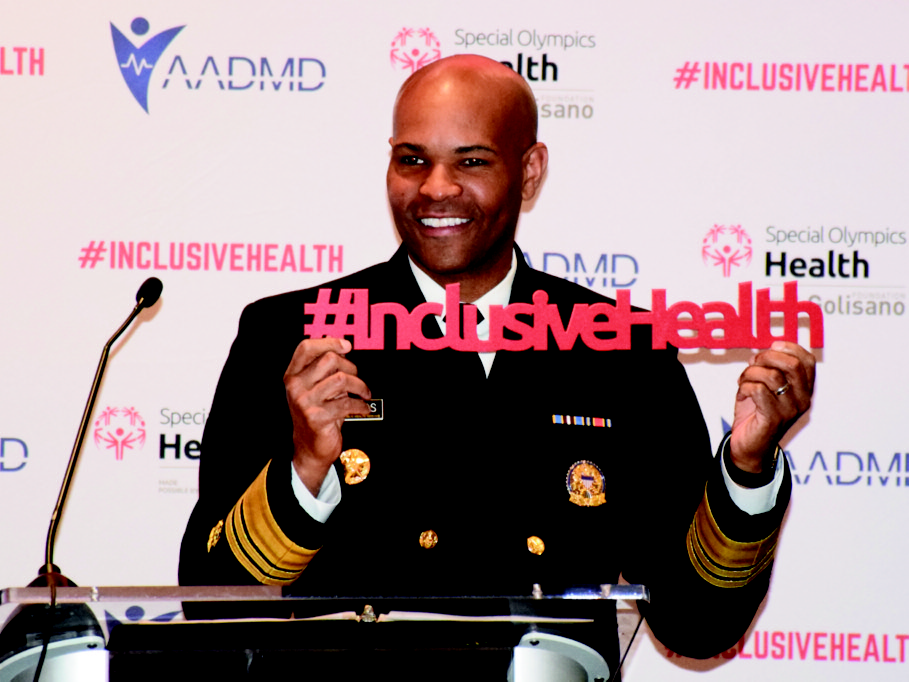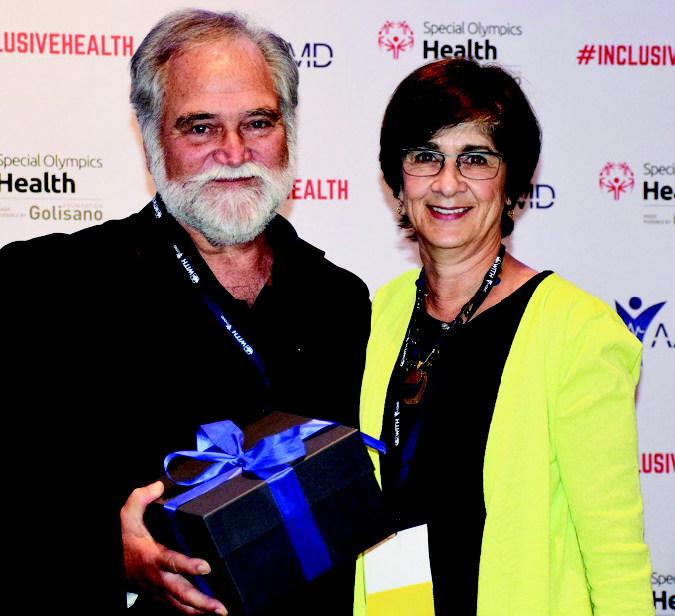Igniting Change Summit Sparks Special Olympics; Dr. Rick Rader Honored by Golisano Foundation


BEING THE CHANGE: (Above) Dr. Timothy Shriver, Chairman of Special Olympics International, shares the spotlight with the Surgeon General of the United States, VADM Jerome M. Adams (right). Dr. Adams' keynote address focused on forging strong relationships within the public health community and exploring new partnerships with businesses and law enforcement.
Between July 1-6, 2018 Seattle welcomed 4,000 athletes and coaches from across the country for the 2018 Special Olympics USA Games. Athletes competed in 14 different sports, joined by 10,000 family members, 10,000 volunteers and 50,000 cheering fans.
Preceding the Games, Special Olympics, in partnership with the American Academy of Developmental Medicine and Dentistry (AADMD) brought together a group of U.S.based health influencers for a special event, Igniting Change: Inclusive Health Summit, at the AADMD 16th Annual Educational Conference. Inclusive Health is the inclusion of people with intellectual disabilities (ID) in mainstream health policies and laws, programming, and services, training programs, research and funding streams.
At the Igniting Change event, attendees learned about Inclusive Health and what their organizations can do to help bridge health disparities that people with ID commonly face. They heard from those who have made strides in inclusive health and how their organizations and their communities have benefitted from becoming more inclusive. The Surgeon General of the United States, VADM Jerome M. Adams delivered the keynote address at the Special Olympics Healthy Athletes symposium. The Surgeon General's recognition of the need to improve access to inclusive healthcare for individuals with intellectual disabilities is a reflection of his motto, "Better health through better partnerships."
The Golisano Foundation's Move to Include Award was presented to Dr. Rick Rader, Director of the Morton J. Kent Habilitation Center at Orange Grove Center and Editor in Chief of the award-winning Exceptional Parent magazine on June 29, 2018 at the AADMD 1 Voice Conference in Seattle, Washington. Golisano Foundation Executive Director Ann Costello presented the award, noting that Rick originally wrote the Move to Include award description when it was launched, and believes and acts in the purest realm of the essence of "move of include," believing in sanctity, value and merit of "together," and knowing that "together" transcends inclusion. The award is given in the hope that the understanding of "include" can be elevated, promoted, ingrained and demonstrated at the highest levels of human behavior. The award is named after the Move to Include initiative launched in 2013 to advance inclusion in all aspects of our community.

FDA Taking Steps To Understand Patient Perspectives For Drug Product Development And Evaluation
BY JOHN WHYTE, M.D., M.P.H.
Over the years, the U.S. Food and Drug Administration (FDA) found great value in working with various stakeholders in product development and evaluation.
In particular, we found that input from patients and patient advocates can help us better understand diseases, their impact on individuals and families, and their possible treatment options. Patient input can also help influence the design of better clinical trials.
Assessing the benefits and risks of a drug product forms the foundation of FDA's regulatory review. Assessments capture evidence, uncertainties, and the reasoning that we use to arrive at our final regulatory decisions. We recognize that patients are in a unique position to contribute to FDA's understanding of drug benefit and risk considerations, and that patients who live with a disease have a direct stake in the outcome of the FDA review process. That said we want to bring patient perspectives into the earlier stages of the human drug, biologic and device development process because we know that a more systematic and rigorous approach to collecting patient input is needed.
PATIENT FOCUSED DRUG DEVELOPMENT WORKSHOPS
The Prescription Drug User Fee Act (PDUFA) directed the agency to systematically consider patient perspectives, experiences and preferences related to treatment. In addition, the 21st Century Cures Act (Cures Act) calls upon FDA to consider how to incorporate relevant patient experience data and related information into the structured benefit-risk assessment framework that informs regulatory decision-making. To address these requirements, the agency has been holding public workshops for patients and patient advocates, as described in its Plan for Issuance of Patient-Focused Drug Development Guidance.1 Between 2012 and 2017, the agency held 24 patient-focused drug development meetings to gather direct patient input. These meetings were highly informative and productive. We found that patient input can provide us with key clinical insights and direct evidence that help us better frame our assessment of benefits and risk.
These public workshops are also helping inform new draft guidances that will be issued within the next five years. These guidances will describe methods for systematically collecting key information about patients' experiences in clinical trials as well as how patients feel about the burden of their disease and the benefits and burdens associated with a therapy. Patients and patient groups can request a meeting on drug-related topics by contacting the CDER Professional Affairs and Stakeholder Engagement staff here: fda.gov/aboutfda/centersoffices/officeofmedicalproductsandtobacco/cder/ucm542986.htm2
NEXT STEPS
Today there are many tools that can measure treatment benefits for patients – including wearable devices, medical apps and others. These tools can bring us a better understanding of how patients experience their illness. We want to continue engaging with patients and patient groups to help inform draft guidances or identify possible outcome measures that should be studied. To help facilitate this process, the agency is setting up a framework that patient groups, and especially people with rare diseases, can gather and submit data to us. FDA welcomes all stakeholders to submit reports and other resources 3 via email at PFDDresources@fda.hhs.gov relating to or containing patient experience data. In the battle against disease, engaged and informed patients willing to share their experiences are some of FDA's greatest resources. •

ABOUT THE AUTHOR: John Whyte, M.D., M.P.H. is the Director of Professional Affairs and Stakeholder Engagement (PASE) at the Center for Drug Evaluation and Research (CDER) for the U.S. Food and Drug Administration.
References 1. FDA Plan for Issuance of Patient-Focused Drug Development Guidance, accessed online at fda.gov/downloads/ForIndustry/UserFees/PrescriptionDrugUserFee/UCM563618.pdf , May 1, 2018. 2. fda.gov/aboutfda/centersoffices/officeofmedicalproductsandtobacco/cder/ucm542986.htm 3 FDA's External Resources or Information Related to Patients' Experience Webpage FAQs, fda.gov/downloads/ForIndustry/UserFees/PrescriptionDrugUserFee/UCM563618.pdf, accessed online May 1, 2018